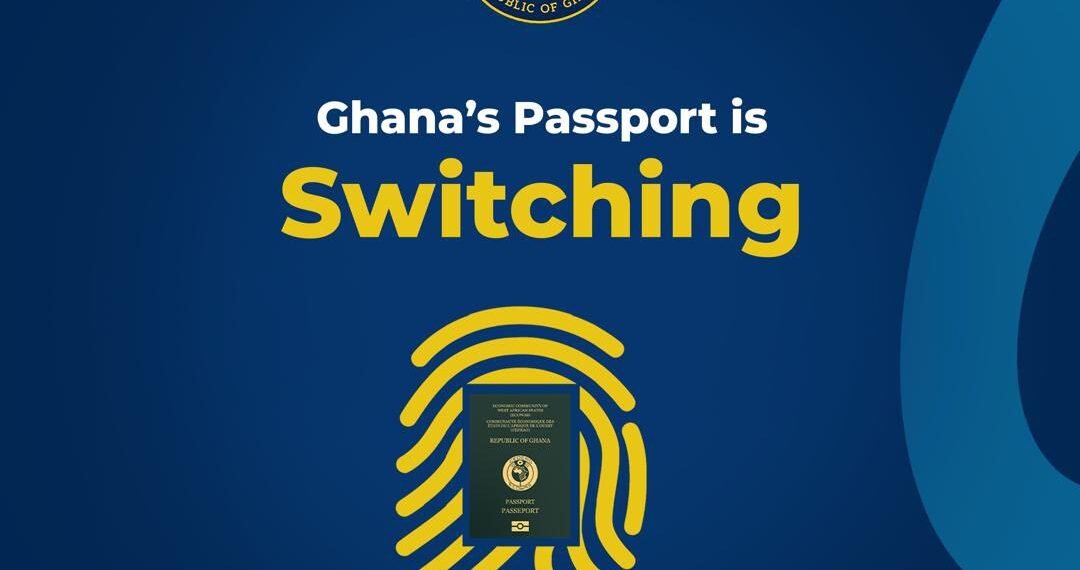The Minority Caucus on the Foreign Affairs Committee of Parliament has issued a strong rebuttal to what it describes as misleading claims surrounding the nationwide rollout of Ghana’s chip-embedded passport.
The Caucus strongly asserted that the project was fully conceptualised, implemented, and officially launched by the Akufo-Addo administration before it exited office in January 2025.
In a detailed press statement signed by Hon. Samuel A. Jinapor, Ranking Member on the Foreign Affairs Committee and Member of Parliament for Damongo, the Minority took issue with the public narrative that followed the April 28, 2025, rollout of the mass issuance of chip-embedded passports by the Ministry of Foreign Affairs under the current administration.
“The event and the commentary that followed have, however, erroneously created the impression that the chip-embedded passport programme was developed and implemented by the current Government.
“The Minority Caucus on the Foreign Affairs Committee of Parliament deems it necessary, in the public interest and institutional transparency, to set out the unimpeachable record relating to this matter as follows:”
Hon. Samuel Abu Jinaor, Ranking Member on the Foreign Affairs Committee and Member of Parliament for Damongo
Setting the record straight, the Minority drew attention to the origins of the initiative, linking it to global standards first adopted by the International Civil Aviation Organisation (ICAO) in 2013.

The ICAO’s 38th Assembly introduced the Traveller Identification Programme (TRIP) Strategy, which included the development of chip-embedded electronic Machine Readable Travel Documents (eMRTDs).
The statement noted that Ghana, like many countries, began internal discussions on adopting this model but struggled to make substantial progress during the years immediately following the ICAO resolution.
According to Hon. Abu Jinapor, it was not until the Akufo-Addo administration assumed office in 2017 that deliberate steps were taken to reform Ghana’s passport infrastructure.
The Minority emphasized that the initiative formed part of the government’s broader digitalisation agenda, aimed at modernising and securing national identification systems.
This agenda culminated in a Public-Private Partnership (PPP) arrangement with local technology firms to design and implement a secure and integrated system for passport issuance.

The statement disclosed that, after evaluating various proposals, the Central Tender Committee on February 21, 2018, approved a DBFMMT (Design, Build, Finance, Manage, Maintain and Transfer) model contract with 25th Century Technology Limited.
“To execute the Project, 25th Century Technology Limited and Buck Press Limited, a reputable service printing outlet with expertise in passport printing, established a special purpose vehicle known as Biometric Travel Solutions Limited”.
Hon. Samuel Abu Jinaor, Ranking Member on the Foreign Affairs Committee and Member of Parliament for Damongo
The PPP approach, the Minority stressed, ensured that the financial burden would not fall on the state, aligning with the government’s commitment to fiscal prudence.
According to the statement, extensive stakeholder consultations, including inputs from the National Security, the Ghana Immigration Service, and international partners, preceded the signing of a formal agreement between the Ministry of Foreign Affairs and Biometric Travel Solutions Limited.
The caucus stressed that under the terms of the contract, the firm was mandated to upgrade Ghana’s passport system to include chip-embedded booklets with polycarbonate data pages and enhanced security features, while also establishing an integrated online application and processing platform.
Chip-Embedded Passport Predates NDC Government
The Minority was emphatic that the full execution of the project had been completed before the current administration took office.
According to them, on December 2, 2024, then-President Nana Addo Dankwa Akufo-Addo officially launched the chip-embedded passport system at a public event in Accra.
According to the Minority, during the launch, passports were issued to President Akufo-Addo, Vice President Bawumia, the Chief of Staff, and other government officials, symbolising the operational readiness of the system.
“At the time of launching this innovative programme on 2nd December, 2024 the Ministry of Foreign Affairs had in stock an initial batch of fifty thousand (50,000) chip-embedded passport booklets, and an additional two hundred thousand (200,000) booklets had been ordered, with delivery scheduled within six months”.
Hon. Samuel Abu Jinaor, Ranking Member on the Foreign Affairs Committee and Member of Parliament for Damongo
This preparation, the statement argued, laid a comprehensive foundation for the national rollout and removed any need for the “relaunch” that took place in April.
They contended that the April event, touted by government officials as a milestone under the current administration, was simply a continuation of a legacy project whose technical, financial, and operational groundwork had been completed before the change in government.
“Every essential aspect of the chip-embedded passport programme, from policy formulation to contract execution and logistical delivery, was meticulously completed by the Akufo-Addo Government before it handed over on 7th January 2025”.
Hon. Samuel Abu Jinaor, Ranking Member on the Foreign Affairs Committee and Member of Parliament for Damongo
Hon. Jinapor and his colleagues argued that this “purported re-launch” of the project constitutes not only a distortion of facts but also an unnecessary expenditure of public funds.

They called on the current government to cease what they describe as attempts to appropriate the achievements of the previous administration for political gain, and instead focus on the efficient distribution and operationalization of the chip-embedded passport system.
The Minority Members on the Foreign Affairs Committee expressed it unwavering commitment to upholding the integrity of Ghana and defending her interests, both at home and abroad, underscoring its dedication to truth and honesty.
While the launch of chip-embedded passports represents a significant step forward in secure and modern travel documentation, the controversy underscores the deep partisan divisions that continue to influence how such national initiatives are communicated to the public.
READ ALSO: Ghana Faces Urgent Climate Financing Gap as 2030 Targets Loom



















